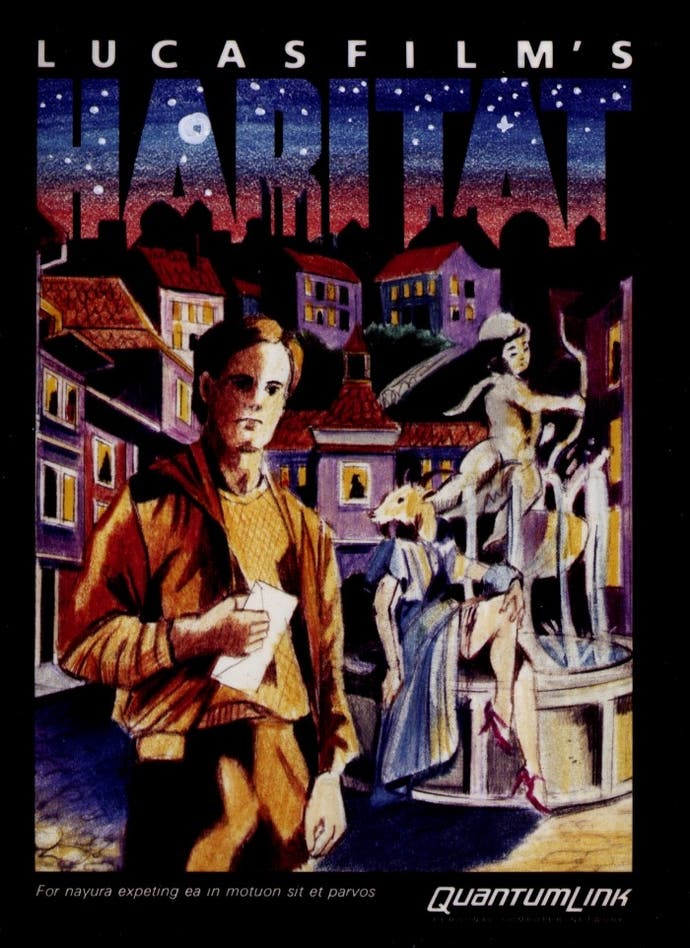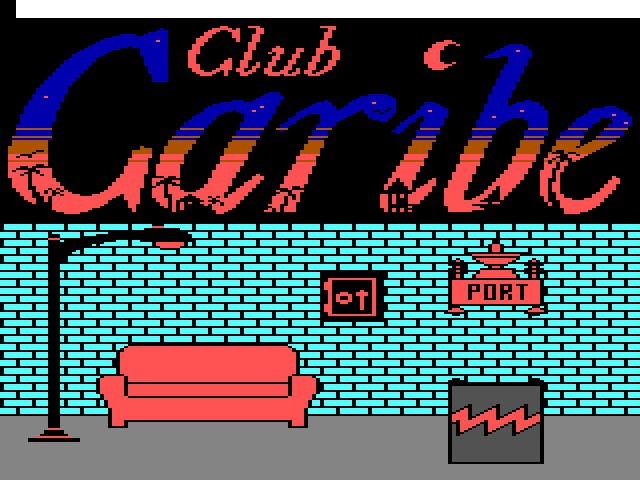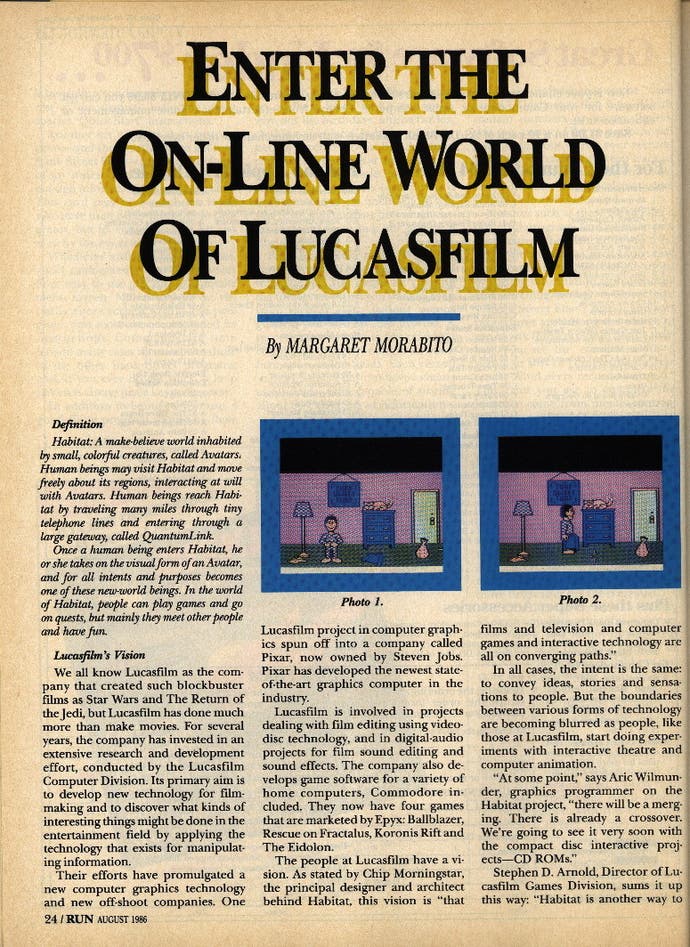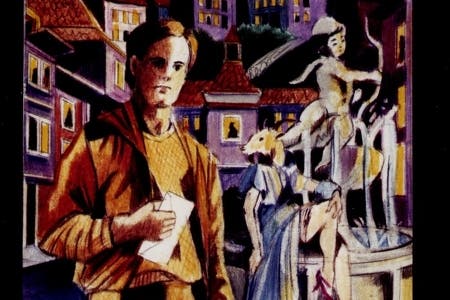Retrospective: Habitat
Tales from inside the first MMO.
You've probably never heard of Habitat, but that's not unusual. Not only was it released over 25 years ago, but even at its peak it was only available to users of a specific online service. And only for the Commodore 64. And only in the US.
In other words: it was pretty niche even by the standards of retro videogames.

Despite being the most easily overlooked of LucasArts' games, it's not an understatement to say it's one of the most influential too. Habitat may be unknown now, but it was the forerunner to the entire MMO genre.
Here's how it worked. You'd log on, paying by the hour, to explore a world that looked like a 2D point and click adventure, with each screen representing a new room. Some rooms had specific rules, such as Homes that could only be accessed with permission from the owner, but most were common spaces containing a handful of objects and people. The first time you logged in you'd customise your avatar, collect some complimentary starting goodies and get kicked out into the first iteration of cyberspace.
Cyberspace; that's what LucasArts chose to call the first MMO, robbing the term from William Gibson's Neuromancer because the alternative suggestion of "multi-player online virtual environment" didn't sound quite as cool.
Unlike most modern MMOs, Habitat didn't weigh new players down with a smattering of quests and dungeons as soon as it started. That's because, unlike contemporary peers, Habitat was intended to be more of a meeting place than an adventure - and that intention was manifested in the unusual world design. Firearms were available alongside magic wands and while the aesthetic was largely suburban humdrum, it occasionally pulled back to whimsy or farce.
Out of this lorelessness came, well, lawlessness. Weapons were widely available but there were few rules to adhere to, meaning the initial test phases were chaotic to say the least. As thieving and murders drained the fun from the game, LucasArts made the decision to step in and impose a restriction; weapons would no longer function within town limits.
In one sweeping move LucasArts tamed the wild west of cyberspace and set a precedent for PVP/PVE that appears in MMOs to this day.
Habitat didn't become a commune of innocence and happiness even after this, however. There were 15,000 players and not only did they have the usual share of minor disagreements, but some chose to make their problems everyone's problems. One player in particular became notorious for roaming the unregulated areas and killing everyone he met. Whether he was the first internet troll or not is debatable, but the controversy he provoked is certain; cyberspace's cowboys called for their first lynching and demanded that weapons be utterly removed from the game.

Fortunately, LucasArts was unwilling to blindly acquiesce to these demands, perhaps due to a reluctance to set too many precedents or to over-feed the sense of player entitlement. An official poll was sent out instead, asking whether virtual murder was a genuine issue or whether Habitat was 'just a game'. The results came back as an even split and, without a majority to push for change, Habitat stayed as it was.
Incidents like this weren't rare in the two years that Habitat remained online. The community was seeing world firsts with enviable regularity and many of them carried consequences that weren't immediately obvious. The first religion, named The Church of The Holy Walnut and ministered by a real-life Greek Orthodox priest, was initially just a sociological curiosity, but became much more when virtual weddings were proposed. Wild west transitioned to modern Las Vegas as LucasArts made it clear these weddings were strictly avatar-to-avatar, not human-to-human; what happens in cyberspace, stays in cyberspace.
The process of uncovering so many world firsts was understandably problematic for Habitat as more complex problems emerged. LucasArts learned the value of player tracking, for example, when the staff logged on one Monday morning to find a handful of millionaires had been inexplicably made over the weekend. With no easy method of investigation available, answers were demanded of the players - but were met with confident rebukes as the newly rich insisted the money had been earned 'fair and square'.

It was only through what Habitat designer Chip Morningstar would later refer to as 'abject pleading' that the team was able to discover the source of the funds - that an item which could be bought for 75 tokens on one side of town could be sold for 100 on the other. Players had invested hours running between the two stores - a possibility the team had never considered because gold farming hadn't previously existed.
"Cyberspace architects will benefit from study of sociology and economics as much as from computer science," warned a sage Morningstar in a 1991 essay on the game.
While Habitat's first economic hiccup caused the in-game currency to be diluted by a factor of five, the team still took a valuable lesson about player negotiation from the experience - one that would come in handy for Habitat's biggest event, the Dungeons of Death.
Prefaced for weeks by adverts in Habitat's user-made newspaper, The Weekly Rant, the Dungeon was supposedly a colossal maze inhabited by the Grim Reaper himself. In reality the role of the Reaper fell to a series of staffers who took turns to patrol the maze with two unique items; one for healing themselves of damage, the other for instantly killing players.
After weeks of planning the Dungeon opened and became an immediate sensation; excited players would dash through, firing in useless terror whenever the Reaper appeared and trying to map a way to victory as they went. It worked perfectly...until someone managed to kill the Reaper and take his weapon from him. Twice.
The first time it happened the man behind the shroud was a Customer Service rep, who immediately followed the precedent set by the previous economic issue, breaking character and brusquely threatening an account ban unless the weapon was returned. Not understanding what had happened the player relented, but left annoyed that what should have been a achievement had instead become an anticlimax. It was a feeling Habitat designer Randall Farmer wanted to avoid when he was later overwhelmed by four players at once in his turn as the Reaper.

Staying in character and summoning the most imposing tone he could muster, Farmer threatened the players with in-game death instead, assuring them that no matter where they went the Reaper would follow. Buoyed up by the triumph of victory the players confidently stood their ground until the idea of ransom was presented; only for 10,000 tokens could the Reaper have his scythe back, they said.
Conducted in public and foreshadowed by yet more melodrama, the ransom was the perfect solution for all parties, securing game balancing while also celebrating the players for their achievement. The handover became an even greater sensation than the Dungeon opening, heavily attended and discussed endlessly for weeks to come - all because Habitat's designers had noted the power of staying in character when dealing with players.
Sadly, despite the adaptability of Habitat's staff and the zeal with which players approached the game, financial and marketing pressures became a problem over time. Despite running from 1986 to 1988 Habitat had never officially come out of beta and ended up closing shortly after its own launch party. LucasArts would later release a modified version of the game, but the original Habitat was long gone by then. Eventually LucasArts flogged the technology to Fujitsu wholesale, who released a visually improved version for Japanese audiences.
In his 1991 post-mortem of the game, designer Chip Morningstar warns that cyberspace architects would do well not to focus too much on graphical advances, however. Instead, he says it's the sharedness of the environment that is most crucial, not the display technologies that support it. He points to Habitat as proof that lush graphics aren't a requirement and says anecdotes are cyberspace's most valuable commodity, because these stories have the potential to change the world.
And I'm inclined to agree.
